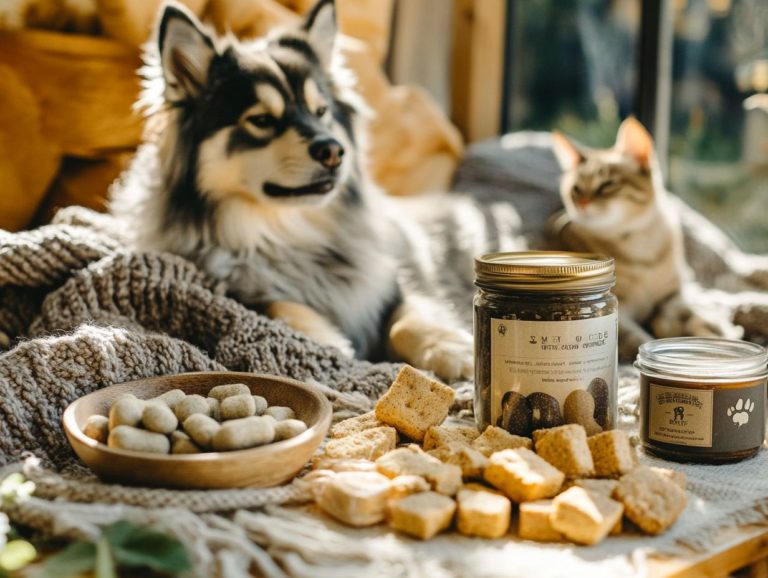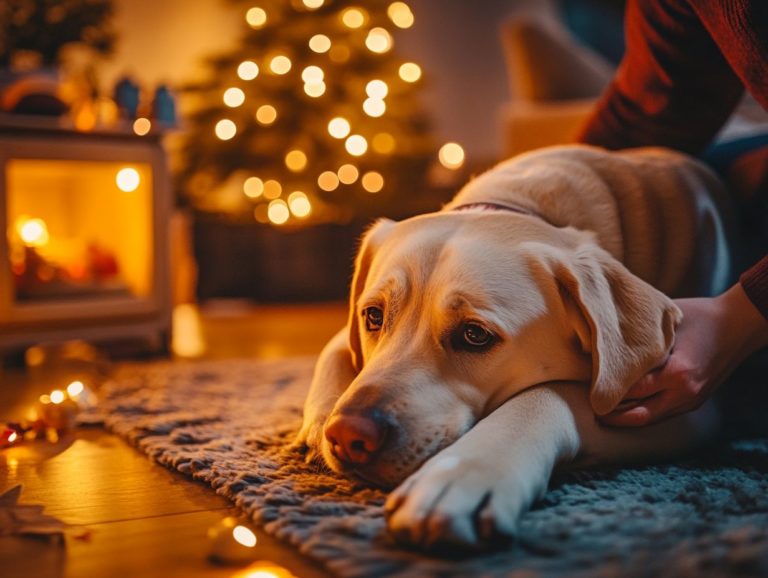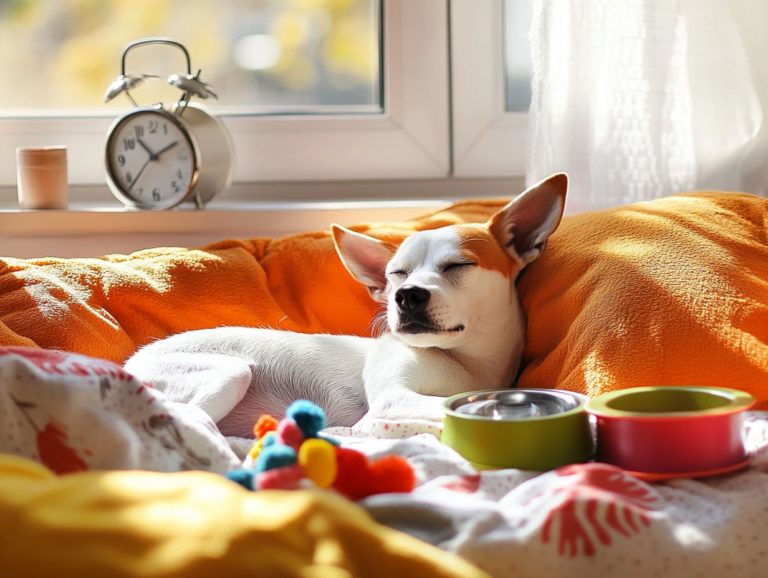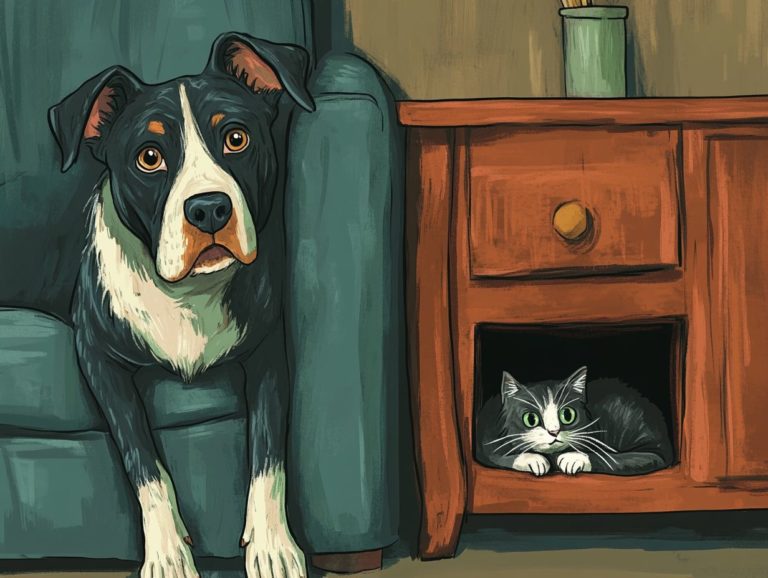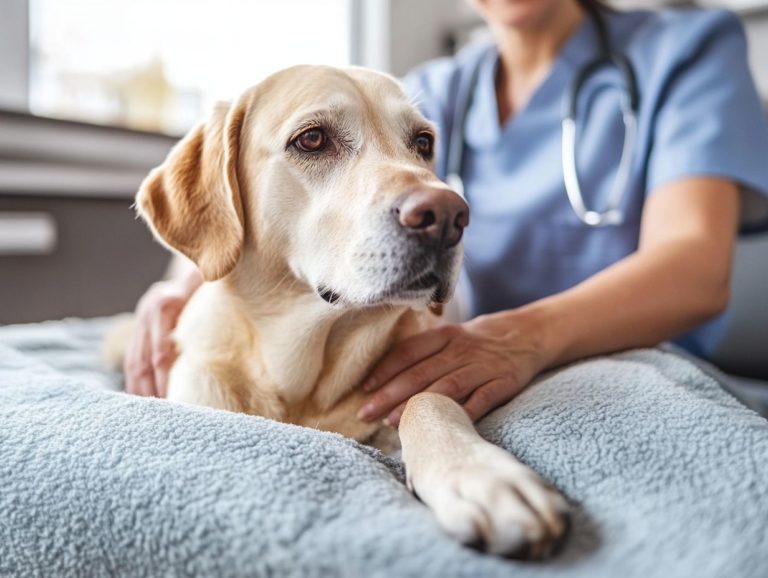How to Help Pets with Anxiety During Fireworks
Fireworks can transform the night sky into a mesmerizing display for humans, but for your furry companions, they often unleash a torrent of fear and anxiety. The cacophony of loud noises can trigger distressing behaviors, leaving pets feeling unsettled and vulnerable.
This exploration delves into the effects of fireworks on animals. Be aware of the signs of anxiety in your pet, and don’t hesitate to seek help from a veterinarian. Their insights can be tailored to your pet’s individual needs, ensuring a comprehensive approach to alleviating their distress. By providing ample support and comfort, you can help your pet navigate these stressful situations.
For anxious pets, exploring alternative options such as calming products, medications, and professional training can offer effective support during those stressful moments. This guide also explains how to create a soothing environment for your pet.
Contents
- Key Takeaways:
- The Impact of Fireworks on Pets
- Signs of Anxiety in Pets
- Ways to Help Pets Cope with Fireworks
- Alternative Options for Anxious Pets
- Frequently Asked Questions
- What can I do to help my pet with anxiety during fireworks?
- How can I create a safe space for my pet during fireworks?
- What are some calming techniques I can use for my pet during fireworks?
- Can I give my pet medication to help with their anxiety during fireworks?
- What should I do if my pet’s anxiety during fireworks is severe?
- How can I prepare my pet for fireworks beforehand?
Key Takeaways:

- Understand how loud noises can affect pets and identify signs of anxiety in your furry friend.
- Create a safe space for your pet during noisy events. Behavior modification techniques, like gradually exposing your pet to loud noises in a controlled way, can help them cope.
- Consider calming products or training options to ease their stress during fireworks.
The Impact of Fireworks on Pets
The festivities surrounding holidays such as the Fourth of July frequently feature fireworks, which can pose a significant challenge for your beloved pets, potentially inducing anxiety and distress. Consider planning ahead for events like these to ensure your pet is as comfortable as possible. Similarly, New Year s Eve can also pose a challenge for pets, so having strategies in place is essential.
Some breeds, like Shiba Inu, Great Danes, Border Collies, and Boxers, are particularly sensitive to the abrupt, loud noises, often exhibiting behaviors like barking, shaking, or even seeking refuge in hiding spots.
As a pet owner, it’s essential to recognize how fireworks can affect your furry companions, especially in states like New Jersey, where fireworks displays are a common occurrence. Understanding the signs of anxiety in pets is vital for safeguarding their health and well-being during stressful events. You can learn how to help your anxious pet adjust to vet visits to ensure they feel more secure in various situations, including during fireworks displays or thunderstorms.
Understanding the Effects of Loud Noises on Animals
Loud noises, like fireworks, can profoundly impact animals. They often lead to noise aversion and anxiety-induced behaviors.
It’s crucial to understand how sound affects your pet’s mood. Intense noises can trigger physical reactions such as an increased heart rate and instinctual hiding behaviors.
Your pets may show stress signs, including pacing or destructive actions. These behaviors highlight the need for careful observation and timely intervention.
Act now! Identify anxiety symptoms early and implement training focused on getting them used to loud noises. Create a comfortable environment by gradually exposing them to quieter sounds.
Consider integrating calming aids into their routine. This can significantly help manage their reactions.
Seek guidance from a veterinarian. Their advice can be tailored to your pet’s individual needs, ensuring comprehensive support.
Signs of Anxiety in Pets
Recognizing the signs of anxiety in pets is vital, particularly during stressful events like fireworks displays or thunderstorms. For more insights, check out understanding pet anxiety during thunderstorms.
Look out for symptoms like barking, trembling, and seeking refuge. Physical reactions may include shaking or excessive panting.
These signs can be alarming, making attentive observation and timely action essential!
Behavioral and Physical Symptoms
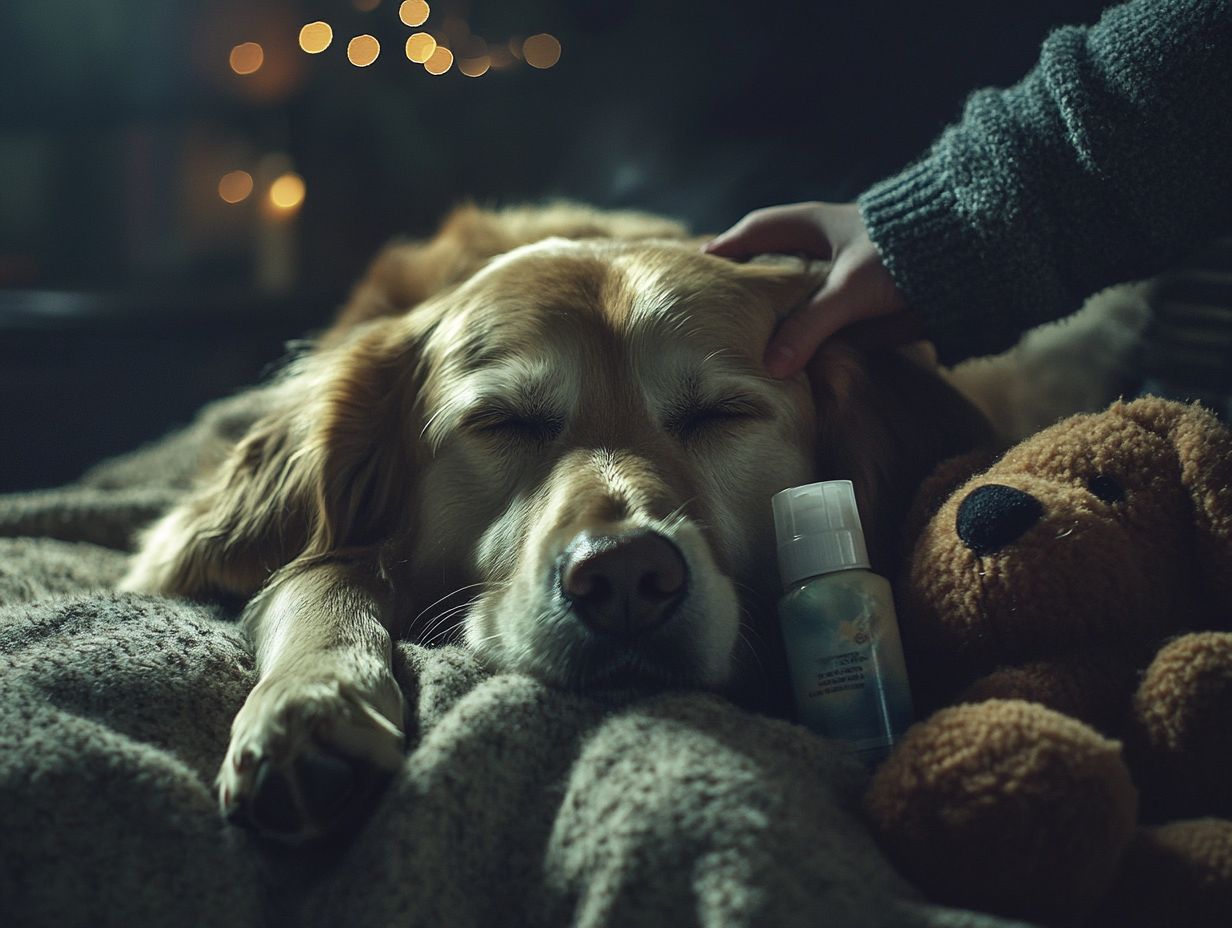
Anxiety symptoms in pets can show up as shaking, barking, or hiding. These behaviors signal distress during events like fireworks.
Some dogs scramble under furniture seeking safety. Cats may groom excessively or vocalize more when loud sounds occur.
To alleviate anxiety, take several steps:
- Create a safe space with familiar items.
- Use calming music to relax them.
- Consider anxiety wraps that apply gentle pressure for security.
By recognizing these signs, you can create a comfortable and secure environment for your anxious pets.
Ways to Help Pets Cope with Fireworks
Regarding helping pets manage the anxiety triggered by fireworks, your priority should be to create a secure and comforting environment where they can truly feel at ease. For more tips, check out how to help your anxious pet feel safe.
Create a calm space for your pets. Use distraction techniques and calming aids like anxiety vests to help them relax. For more strategies, check out how to recognize and address anxiety in pets. Incorporating soothing music or white noise machines can also help drown out those jarring sounds.
These strategies are especially crucial during high-stress occasions, such as the Fourth of July. With the Fourth of July just around the corner, it s time to get your pets ready!
Creating a Safe and Comfortable Environment
Creating a safe and comfortable environment for your pets during stressful situations, like fireworks, is essential for their well-being and can significantly ease their anxiety. For more specific strategies, check out how to help a rescue pet with anxiety.
You have various methods at your disposal to ensure your pets feel secure and at ease. Using crates provides a personal space for pets and mimics a den-like atmosphere that many animals find soothing.
Anxiety vests can truly be a game-changer, applying gentle pressure that calms them down effectively.
Consider playing soothing music or using white noise machines to help drown out those jarring sounds, further contributing to a serene environment. It s also important to incorporate some training techniques, gradually acclimating your pets to these strategies so they see them as safe outlets rather than sources of discomfort.
Behavior Modification Techniques
Helping your pets get used to loud noises gradually can be remarkably effective in managing their anxiety related to fireworks and other loud noises, especially during the holiday season.
By gradually exposing your furry friends to recorded sounds at a low volume while showering them with positive reinforcement, you can help them build resilience over time.
Incorporating veterinary support can elevate these techniques, as professionals provide tailored strategies and resources to tackle specific behavioral challenges.
Calming music and interactive toys can significantly reduce your pet s stress. Gentle exercises not only distract your pet but also minimize stress in those anticipatory moments. This comprehensive approach ensures that your pets learn to associate loud noises with positive experiences, creating an environment where they feel secure, even during the most stressful events.
Alternative Options for Anxious Pets
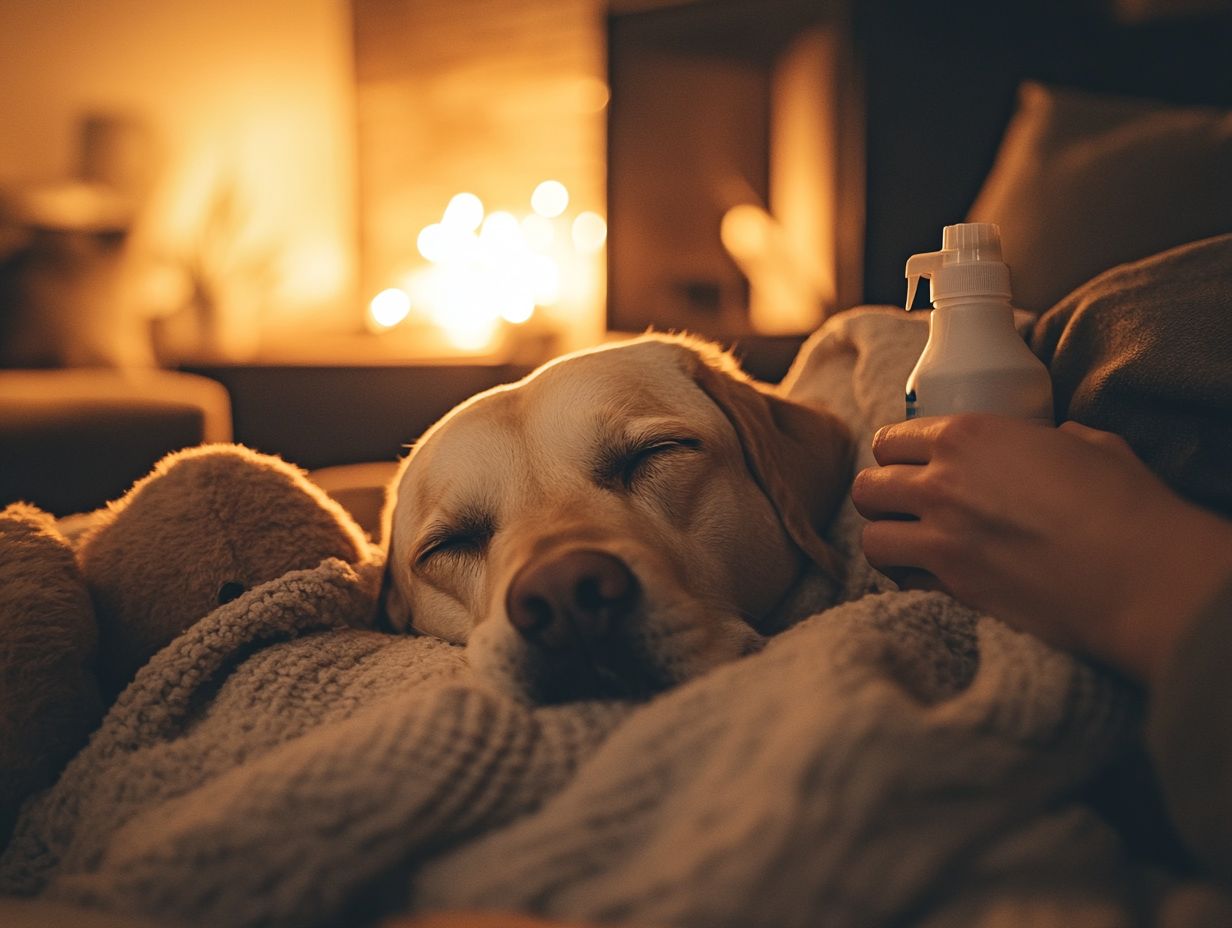
For anxious pets, exploring alternative options such as natural supplements, medications, and CBD products can offer effective support during those stressful moments, whether it’s the booming of fireworks or the rumble of thunderstorms.
Take action today to ensure your furry friends feel safe and secure!
Natural Supplements and Medications
Natural supplements can help your pet manage anxiety. Products like CBD are becoming popular among pet owners.
These products can enhance your pet’s emotional well-being. They help reduce stress during tough times, like fireworks or vet visits.
You might also consider herbal remedies, omega-3 fatty acids, and specific amino acids. These are being explored for their potential to uplift mood and alleviate stress.
However, it’s crucial to remember that while many of these products can be beneficial, they may also come with side effects like digestive upset or lethargy. Consulting with a veterinarian before introducing any new regimen will help you make informed decisions that cater to your pet’s unique health needs.
Professional Training and Therapy
Professional training can make a big difference for anxious pets. Behaviorists and trainers offer personalized support to help your furry friend navigate stressful situations, such as the dreaded sounds of fireworks. Learning how to train your pet to handle loud noises can be particularly beneficial.
Trainers use methods like gradual exposure to fears and rewarding good behavior to help pets. They create a secure environment where your pet can confront their fears gradually.
Ongoing support is invaluable. As your pet makes progress, behaviorists check in regularly to adjust strategies and reinforce essential skills. This guidance builds confidence and resilience, fostering a more harmonious home life for both of you.
Frequently Asked Questions
What can I do to help my pet with anxiety during fireworks?
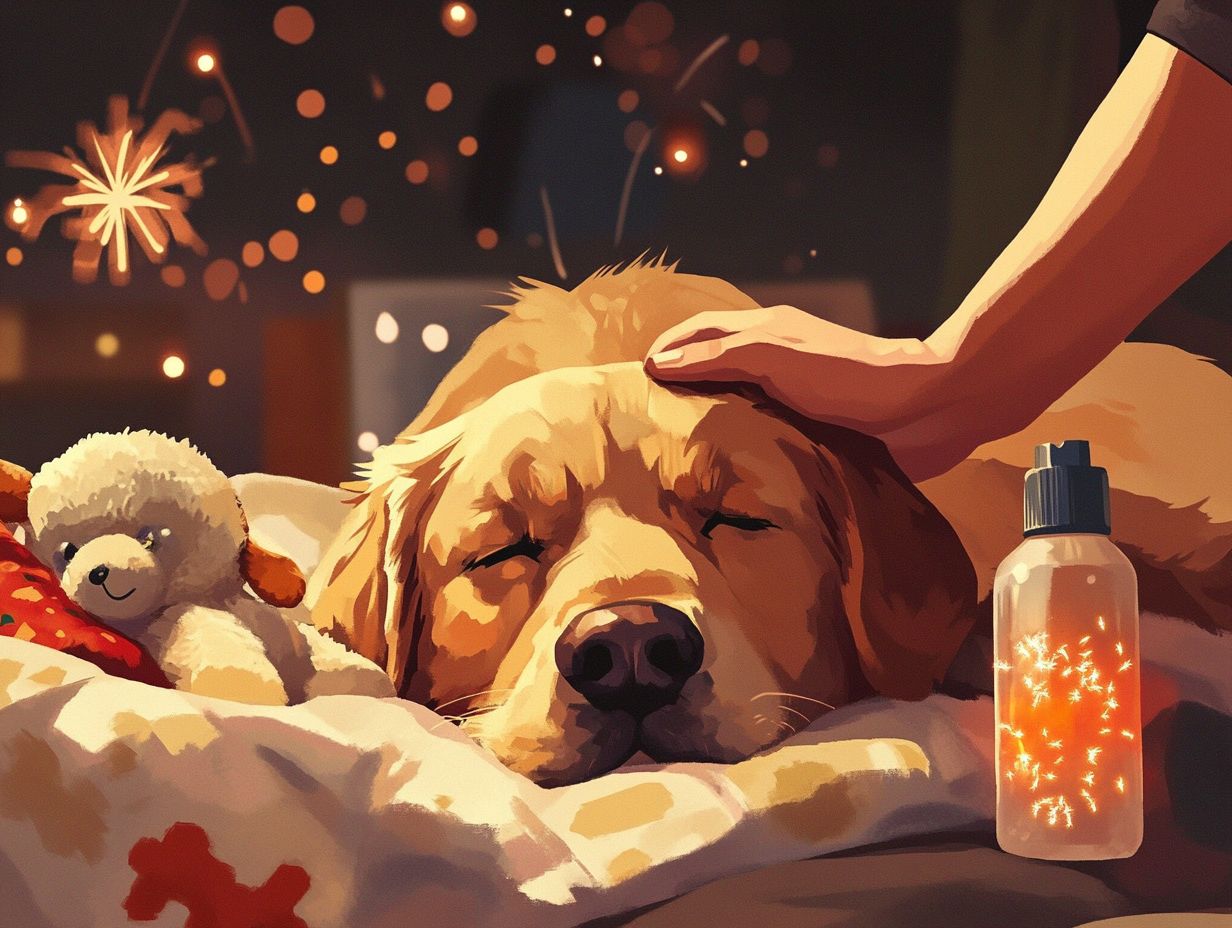
There are a few things you can do to help your pet during fireworks. Create a safe space for them, use calming techniques, and consider learning how to help a pet with travel anxiety to further support them and seek help from a professional.
How can I create a safe space for my pet during fireworks?
Create a safe space by setting up a quiet, comfortable area in your home. Choose a room or space your pet is familiar with, and use soft blankets or bedding to make it cozy.
What are some calming techniques I can use for my pet during fireworks?
Try various calming techniques, such as using calming pheromone sprays or diffusers, playing soothing music or white noise, and using pressure wraps or anxiety vests to help with noise sensitivity.
Can I give my pet medication to help with their anxiety during fireworks?
Always talk to your veterinarian before giving your pet any anxiety medication. They may prescribe medication or suggest natural remedies that are safe for your pet.
What should I do if my pet’s anxiety during fireworks is severe?
If your pet’s anxiety is severe, seek help from a professional, such as a certified animal behaviorist or a veterinarian specializing in behavior. They can assess your pet’s situation and provide a personalized treatment plan.
How can I prepare my pet for fireworks beforehand?
Prepare your pet for fireworks by exposing them to loud sounds. Use recordings of fireworks in a safe space.
Consider working with a professional who can help your pet get used to loud noises. It’s best to start this process early!

